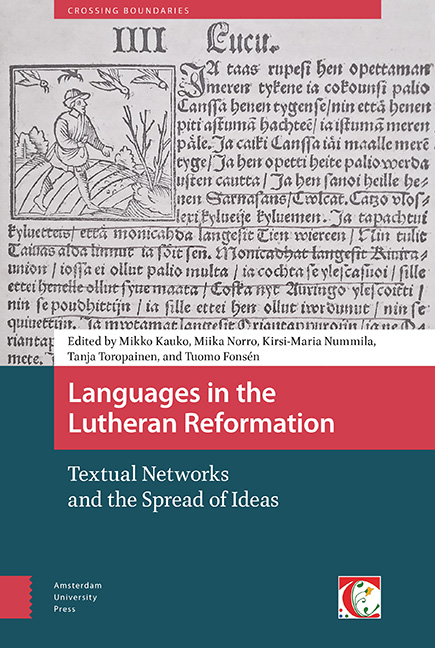Book contents
- Frontmatter
- Contents
- List of Figures and Tables
- Preface
- Introduction
- Part I The Reception of Luther's Ideas and their Influence for the Development of Written Languages
- Part II Effects of Bible Translations on the Evolution of Written Language
- Part III Reuse of (Catholic) Texts after the Reformation
- Part IV Language Contacts and Loanwords
- Index
Preface
Published online by Cambridge University Press: 21 November 2020
- Frontmatter
- Contents
- List of Figures and Tables
- Preface
- Introduction
- Part I The Reception of Luther's Ideas and their Influence for the Development of Written Languages
- Part II Effects of Bible Translations on the Evolution of Written Language
- Part III Reuse of (Catholic) Texts after the Reformation
- Part IV Language Contacts and Loanwords
- Index
Summary
In 2017, the 500th anniversary of the Lutheran Reformation was celebrated in several countries. In connection with the jubilee year, a lot of new research on the Lutheran Reformation was done, for example by theologians, historians – and linguists. The jubilee year was also commemorated by TUCEMEMS (the Turku Centre for Medieval and Early Modern Studies) – a multidisciplinary centre funded by the University of Turku with a focus on interdisciplinary and cross-cultural topics from late Antiquity to the 1700s.
In October 2015, a two-day cross-lingual seminar was arranged by the linguistics working committee of TUCEMEMS in Turku with the title Languages in the Lutheran Reformation. The working committee was convoked by Adjunct Prof. Tuomo Fonsén. The present members of the committee are Prof. Emerita Irmeli Helin, Prof. Emerita Kaisa Häkkinen, M.A. Ruut Kataisto, Dr. Mikko Kauko, M.A. Miika Norro, Adjunct Prof. Kirsi-Maria Nummila, Prof. Matti Peikola, Lic. Minna Sandelin, and Dr. Tanja Toropainen. The seminar was international, with invited guests from several countries. The program consisted of discussions and talks that were given mainly in English, partly in German. Researchers from different countries had the opportunity to meet each other and comment on each other's contributions. The seminar talks led to this collection of articles.
In Protestant countries, the Lutheran Reformation had an important effect on languages: several languages that had hardly been written previously became literary when biblical and religious texts were translated into them (e.g., Estonian and Finnish). The Reformation also affected those languages which already had a literary tradition, for instance German and Swedish. Baltic and Slavic languages were also affected in a similar way. However, experts on Scandinavian languages, for example, do not know much about the history of Baltic languages and vice versa, even though they have much in common and have shared fields of interest. This book brings together the different fields of study. Internal developments of individual languages are often well known, but scholars have seldom focused on influences between these languages. By concentrating on these influences, this book offers a novel approach to the Reformation. Central fields of interest include mobility, networks, textual influences, dissemination of texts, exchange of ideas, language use, language culture, and translation activities.
We wish to thank Amsterdam University Press for kind cooperation and TUCEMEMS for important support.
- Type
- Chapter
- Information
- Languages in the Lutheran ReformationTextual Networks and the Spread of Ideas, pp. 9 - 10Publisher: Amsterdam University PressPrint publication year: 2019



